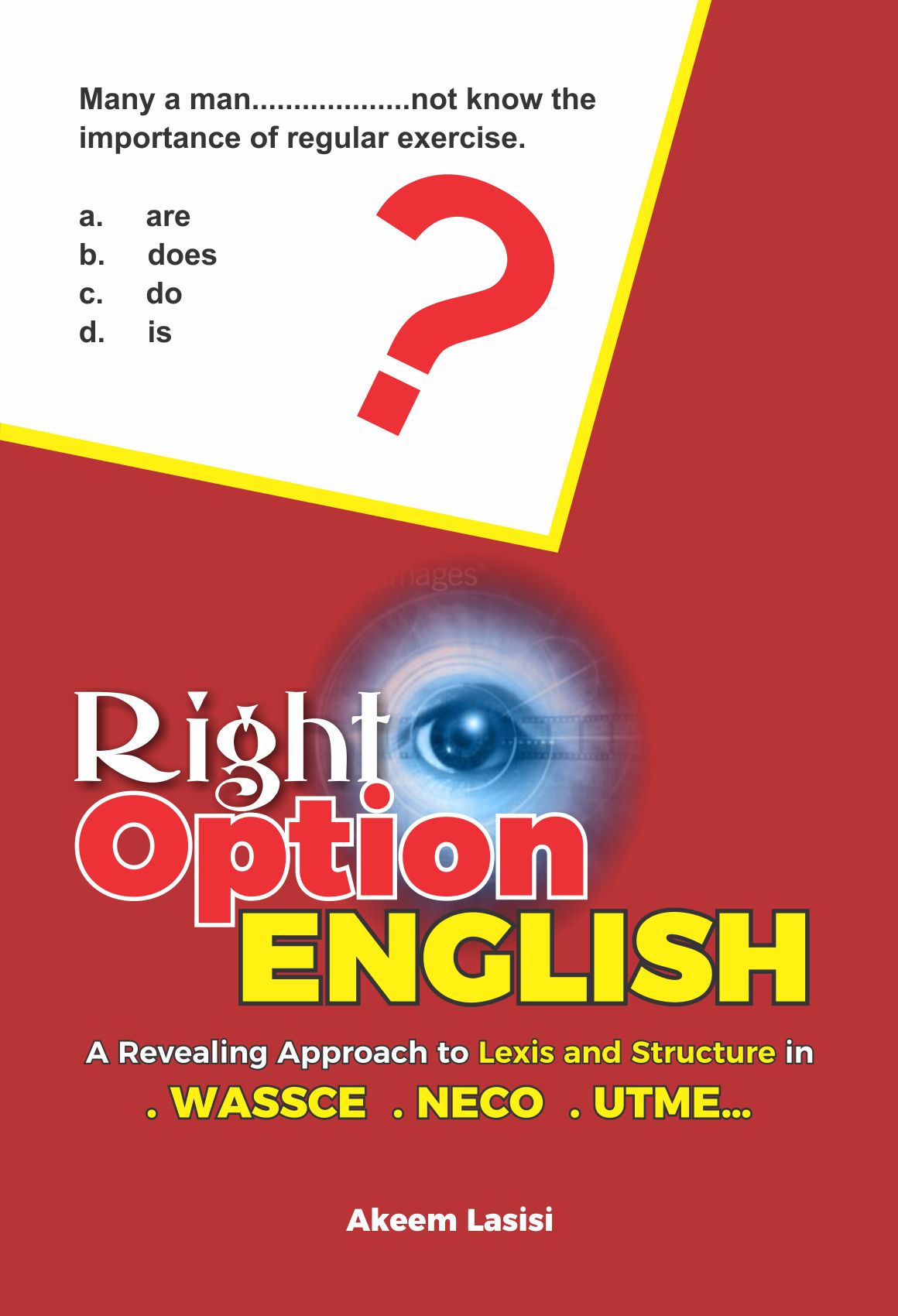By Akeem Lasisi
Each of the eight word classes is tested in various ways, with INTERJECTION being the only one that rarely appears. Because of the indirect way in which they are tested, candidates pay little or no attention to them. At the WASSCE, NECO etc. level, examiners no longer ask such questions as ‘What is a Noun?’ ‘Define Subordinating Conjunctions’, ‘State and explain three types of Adverbs’ etc. They are no more interested in your theoretical knowledge of the word classes but how you correctly use them in the essays or letters you write. Also, they want to test your understanding of the word classes by asking questions that require that you apply the theory that your teacher had imparted in you in the class. Let us see how each of the parts of speech is brought in, NOUNS first.
1. The timely … of the class prefect prevented a flight
between the two pupils.
a. intrusion
b. intervention
c. interference
d. interruption
2. His … is to become a doctor.
a. studying
b. view
c. ambition
d. action
3. There is no … in our classroom.
a. furnitures
b. furniture
c. a furniture
d. any furniture
4. Who is … head boy of your school?
a. a
b. the
c. an
d. any
In Question 1, the candidate is just required to choose the appropriate NOUN out of the four given. This tickles his/her idea of NOUNS as a part of speech that normally functions as the SUBJECT of a clause. Here, the required NOUN will be the HEAD of the PHRASE, “The timely intervention of the Class Prefect”, with ‘The timely’ and ‘of the Class Prefect’ respectively qualifying and modifying the appropriate NOUN.
You should also note that a question such as this normally takes along options whose meanings are identical. The difference, however, is that they operate in different contexts. Options A to D are words signifying “coming into’, ‘coming in-between’ etc. But while intrusion, interference and interruption are largely negative in their intents, ‘intervention’ is normally positive. The context goes a long way to help you solve the problem: the action of the prefect preventing a fight is positive. Thus, ‘intervention’ emerges as the right answer. In effect, when you are to choose the right NOUN, consider the overall meaning(s) of die options, as well as the context.
Now, use the same parameter to solve Questions 2, 3 and 4.
Note that the third question is also testing your knowledge of NOUNS. But if you can remember those lessons on nouns, during which you were taught that nouns such as furniture, luggage and information are UNCOUNTABLE NOUNS, which do not normally take the article a/an, you will not have any problem correctly choosing option B, furniture. The presence of a kicks out options A and C, while the awkwardness in pairing no and any expunges D:
There is no furniture
* There is no any furniture.

Question 4, though not framed ‘What is an ARTICLE?’ or ‘State the difference between articles a/an and the’, is simply testing ARTICLES. Which of the articles shows a previous knowledge of the object being spoken about? Which of them shows that such an object, apart from being familiar, is one and the only one? This is how and why the is the answer. The others, a, an, and any, are primarily wrong because a school normally has one head boy, who is supposed to be known by any responsible member of the school community: Who is the head boy of your school?
The above analysis is, therefore, to show you that the likes of ‘a NOUN is the name of a person, animal, place or thing’ (a defective definition, though); boy : boys, woman; women; proper vs. common nouns; uncountable vs. collective nouns etc., all of which you had been taught right from the Nursery/Primary through the Secondary School, are always relevant in a way.
Study the following questions and, then, answer them, using the method adopted in the foregoing section.
63. Ade decided to wait for the bus because he had …
a. too many luggage
b. many luggages
c. a lot of luggage
d. plenty luggage
64. The … were drawn from different parts of the country are to
receive lectures on Making a Good Home.
a. couples
b. couple
c. couple’s
d. couples’
65. Please, take me to the .– Hostel.
a. Boys
b. Boys’
c. Boyes
d. Boy’s
66. We could tell that Amina was worried from the … on her face.
a. appearance
b. sight
c. expression
d. view
67. His stay in the village afforded him a brief … from his labours.
a. respiration
b. restoration
c. interval
d. respite
68 … American teaches us Arabic.
a. An
b. A
c. Any
d. Many a
69 … yet about the doctor?
a. Is there any news
b. Is there any new
c. Are there some news
d. Are there any news
70. According to … item in the newspaper, scientists have
discovered a vaccine for malaria.
a. a news
b. a piece of news
c. news
d. anew
71. From here to the next town is …. drive.
a. an hour’s
b. an hours’
c. an hourly
d. a hour
72. My … house is by the side of the road.
a. father-in-law’s
b. father’s-in-law
c. fathers’-in-law
d. father-in-laws
(Adapted from Right Option English by Akeem Lasisi)

Phenomenal English Tutor
Watch this short video and subscribe to Phenomenal English on YouTube for more:



